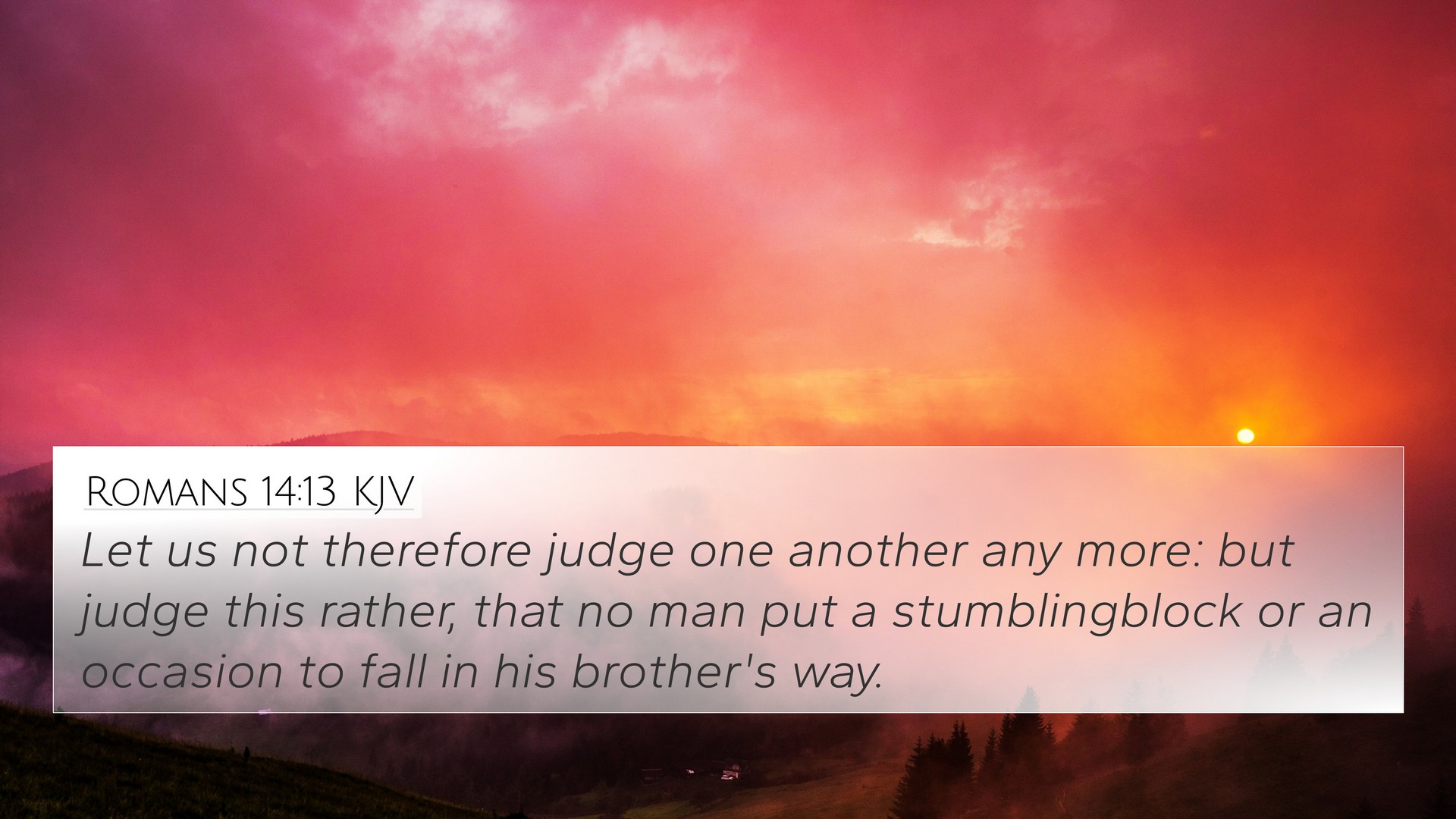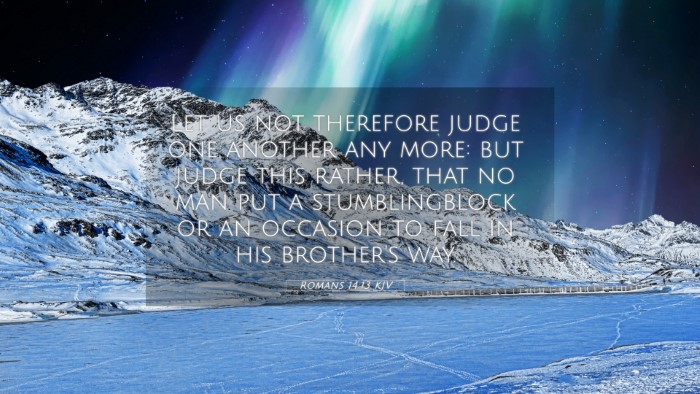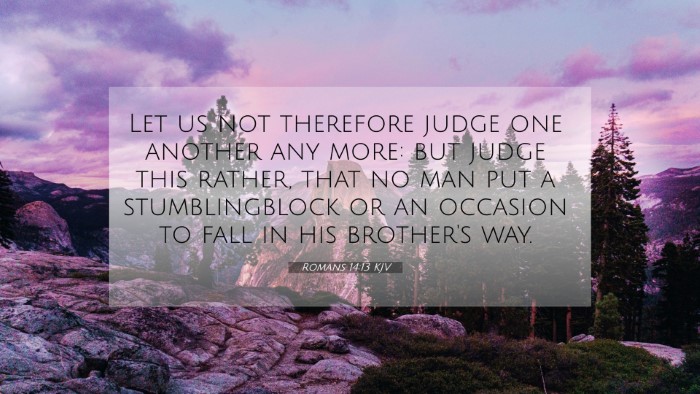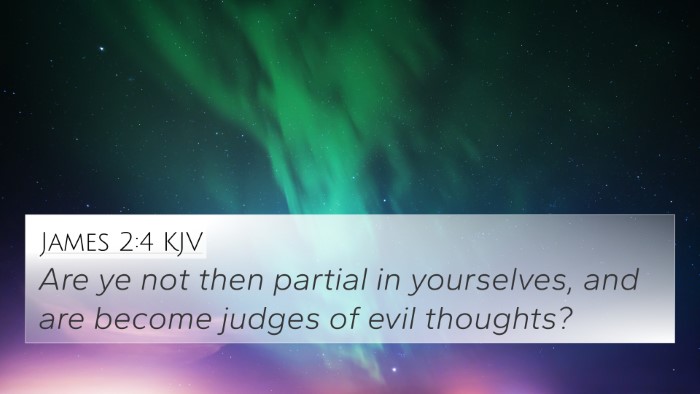Old Testament
Genesis Exodus Leviticus Numbers Deuteronomy Joshua Judges Ruth 1 Samuel 2 Samuel 1 Kings 2 Kings 1 Chronicles 2 Chronicles Ezra Nehemiah Esther Job Psalms Proverbs Ecclesiastes Song of Solomon Isaiah Jeremiah Lamentations Ezekiel Daniel Hosea Joel Amos Obadiah Jonah Micah Nahum Habakkuk Zephaniah Haggai Zechariah MalachiRomans 14:13 Similar Verses
Romans 14:13 Cross References
Let us not therefore judge one another any more: but judge this rather, that no man put a stumblingblock or an occasion to fall in his brother's way.
Uncover the Rich Themes and Topics of This Bible Verse
Listed below are the Bible themes associated with Romans 14:13. We invite you to explore each theme to gain deeper insights into the Scriptures.
Romans 14:13 Cross Reference Verses
This section features a detailed cross-reference designed to enrich your understanding of the Scriptures. Below, you will find carefully selected verses that echo the themes and teachings related to Romans 14:13 KJV. Click on any image to explore detailed analyses of related Bible verses and uncover deeper theological insights.
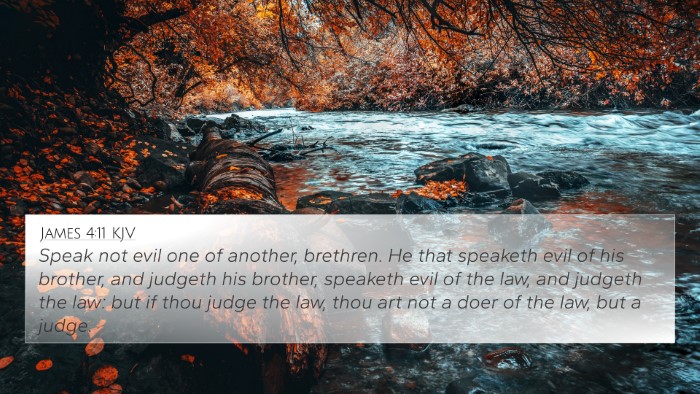
James 4:11 (KJV) »
Speak not evil one of another, brethren. He that speaketh evil of his brother, and judgeth his brother, speaketh evil of the law, and judgeth the law: but if thou judge the law, thou art not a doer of the law, but a judge.
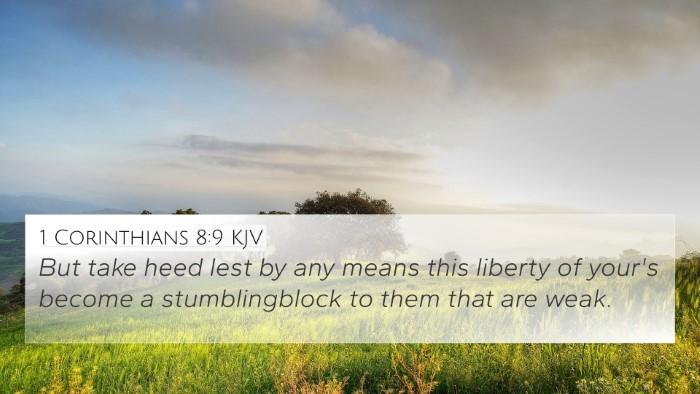
1 Corinthians 8:9 (KJV) »
But take heed lest by any means this liberty of your's become a stumblingblock to them that are weak.
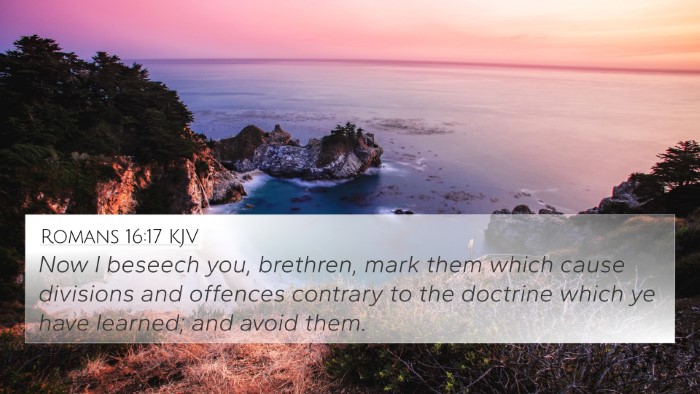
Romans 16:17 (KJV) »
Now I beseech you, brethren, mark them which cause divisions and offences contrary to the doctrine which ye have learned; and avoid them.

1 Corinthians 10:32 (KJV) »
Give none offence, neither to the Jews, nor to the Gentiles, nor to the church of God:

Luke 17:2 (KJV) »
It were better for him that a millstone were hanged about his neck, and he cast into the sea, than that he should offend one of these little ones.
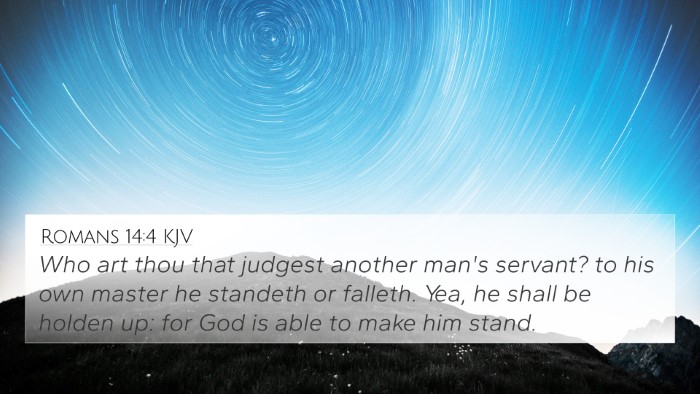
Romans 14:4 (KJV) »
Who art thou that judgest another man's servant? to his own master he standeth or falleth. Yea, he shall be holden up: for God is able to make him stand.

Revelation 2:14 (KJV) »
But I have a few things against thee, because thou hast there them that hold the doctrine of Balaam, who taught Balac to cast a stumblingblock before the children of Israel, to eat things sacrificed unto idols, and to commit fornication.
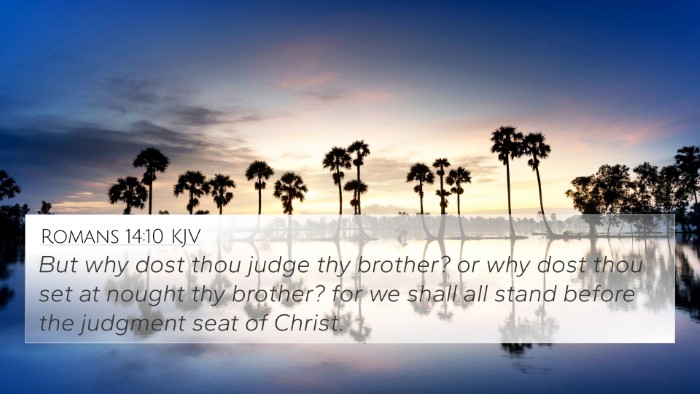
Romans 14:10 (KJV) »
But why dost thou judge thy brother? or why dost thou set at nought thy brother? for we shall all stand before the judgment seat of Christ.

Isaiah 57:14 (KJV) »
And shall say, Cast ye up, cast ye up, prepare the way, take up the stumblingblock out of the way of my people.
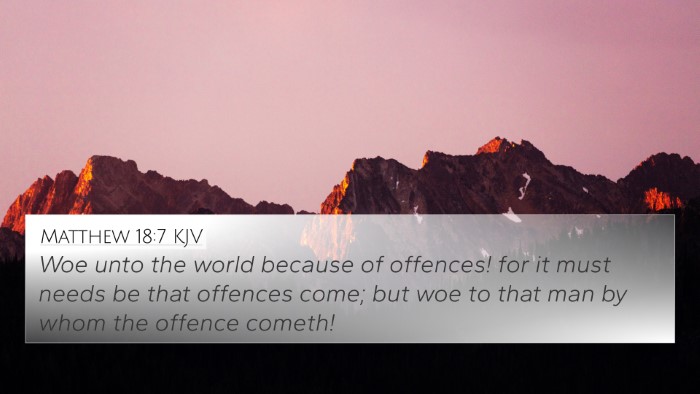
Matthew 18:7 (KJV) »
Woe unto the world because of offences! for it must needs be that offences come; but woe to that man by whom the offence cometh!

1 Timothy 5:14 (KJV) »
I will therefore that the younger women marry, bear children, guide the house, give none occasion to the adversary to speak reproachfully.
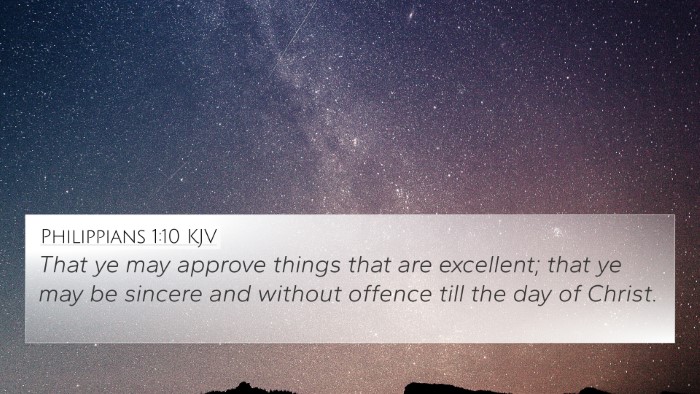
Philippians 1:10 (KJV) »
That ye may approve things that are excellent; that ye may be sincere and without offence till the day of Christ.

1 John 2:10 (KJV) »
He that loveth his brother abideth in the light, and there is none occasion of stumbling in him.

2 Corinthians 5:14 (KJV) »
For the love of Christ constraineth us; because we thus judge, that if one died for all, then were all dead:

Matthew 16:23 (KJV) »
But he turned, and said unto Peter, Get thee behind me, Satan: thou art an offence unto me: for thou savourest not the things that be of God, but those that be of men.

Romans 11:9 (KJV) »
And David saith, Let their table be made a snare, and a trap, and a stumblingblock, and a recompence unto them:
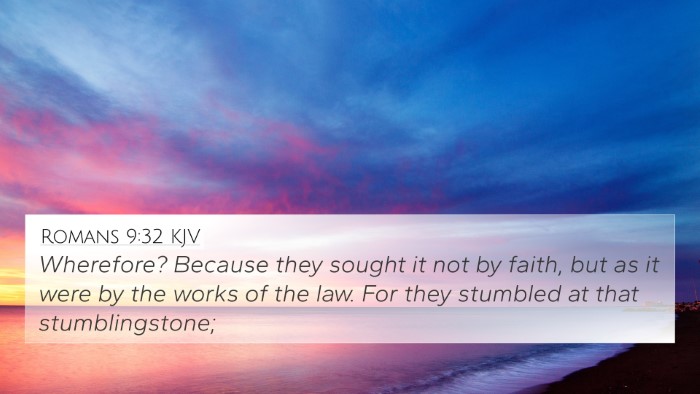
Romans 9:32 (KJV) »
Wherefore? Because they sought it not by faith, but as it were by the works of the law. For they stumbled at that stumblingstone;
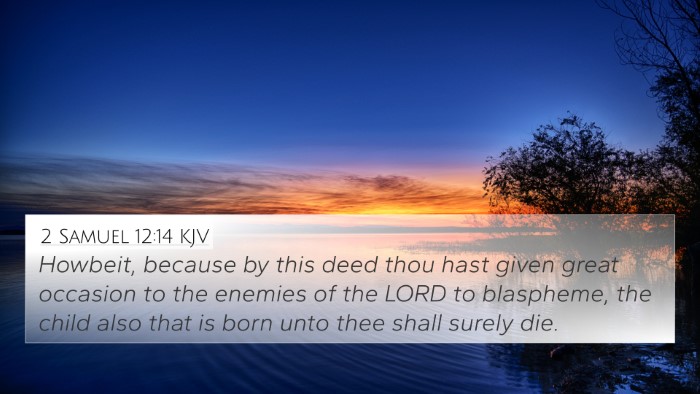
2 Samuel 12:14 (KJV) »
Howbeit, because by this deed thou hast given great occasion to the enemies of the LORD to blaspheme, the child also that is born unto thee shall surely die.
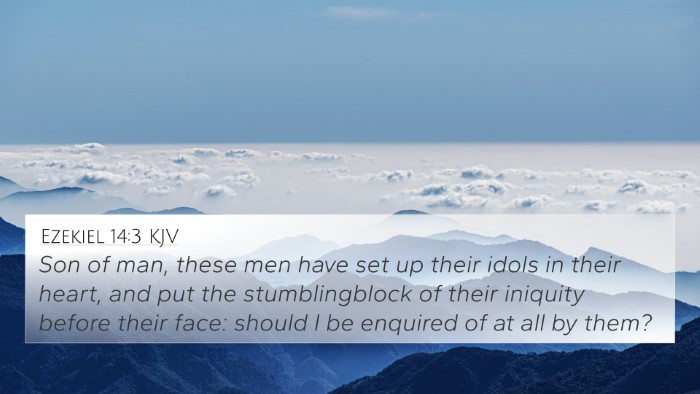
Ezekiel 14:3 (KJV) »
Son of man, these men have set up their idols in their heart, and put the stumblingblock of their iniquity before their face: should I be enquired of at all by them?
Romans 14:13 Verse Analysis and Similar Verses
Understanding Romans 14:13
“Let us not therefore judge one another any more: but judge this rather, that no man put a stumblingblock or an occasion to fall in his brother's way.”
Overview of the Verse
This verse calls believers to refrain from judging one another concerning secondary matters, especially those that may cause others to stumble in their faith. Paul emphasizes the importance of love and consideration for other believers, establishing a key principle within the Christian community: the avoidance of behaviors that could lead someone astray.
Insights from Public Domain Commentaries
-
Matthew Henry:
Henry points out that a critical spirit can hinder the fellowship among believers. He emphasizes the need for mutual understanding and the importance of supporting one another in areas of personal conviction, noting that our actions should build up rather than tear down.
-
Albert Barnes:
Barnes explains that the judgment Paul refers to involves not only condemnation but also the act of causing a brother to stumble. He argues that believers must focus on love over discord, citing that one's strong belief should not lead to arrogance that might negatively influence others.
-
Adam Clarke:
Clarke highlights the significance of the Christian's personal conduct, advocating that believers should remain vigilant about how their freedom in Christ might affect others. He emphasizes that our liberty should not become a stumbling block, calling for a selfless approach to avoid causing others to fall.
Key Themes in Romans 14:13
- Judgment among Believers: The verse admonishes believers against personal judgment, especially regarding issues that are non-essential to faith.
- Love and Consideration: Emphasizes love as a guiding principle, ensuring that our conduct does not lead others into sin.
- Responsibility for Others: Encourages members of the church to act responsibly for the benefit of their community.
Cross-References
- Romans 14:1: “Him that is weak in the faith receive ye, but not to doubtful disputations.”
- 1 Corinthians 8:9: “But take heed lest by any means this liberty of yours become a stumblingblock to them that are weak.”
- Galatians 5:13: “For, brethren, you have been called unto liberty; only use not liberty for an occasion to the flesh, but by love serve one another.”
- Philippians 2:3: “Let nothing be done through strife or vainglory; but in lowliness of mind let each esteem other better than themselves.”
- James 4:11: “Speak not evil one of another, brethren. He that speaketh evil of his brother, and judgeth his brother, speaketh evil of the law, and judgeth the law…”
- Matthew 7:1: “Judge not, that ye be not judged.”
- Hebrews 10:24: “And let us consider one another to provoke unto love and to good works.”
Thematic Connections
The verse can be linked to various themes in the Scripture such as unity within the church, mutual edification, and the importance of bearing one another’s burdens (Galatians 6:2). Connecting Romans 14:13 with these themes demonstrates the necessity of a loving community that fosters spiritual growth and prevents division.
Practical Applications
Believers can apply the principles of this verse by cultivating an atmosphere of grace and understanding in their interactions with others. Here are a few practical applications:
- Prioritize love over personal convictions in church matters.
- Engage in open dialogues with those who may see issues differently, fostering understanding.
- Mentor fellow believers respectfully, being sensitive to their spiritual state.
Conclusion
Romans 14:13 serves as a reminder to navigate our freedoms in Christ with care, ensuring that we build each other up in faith rather than cause harm. Engaging with this verse and its analysis through public domain commentaries allows believers to deepen their understanding of Christian love and responsibility. Moreover, employing biblical cross-references can enrich one’s study, revealing a tapestry of interconnected teachings that guide our walk of faith.
